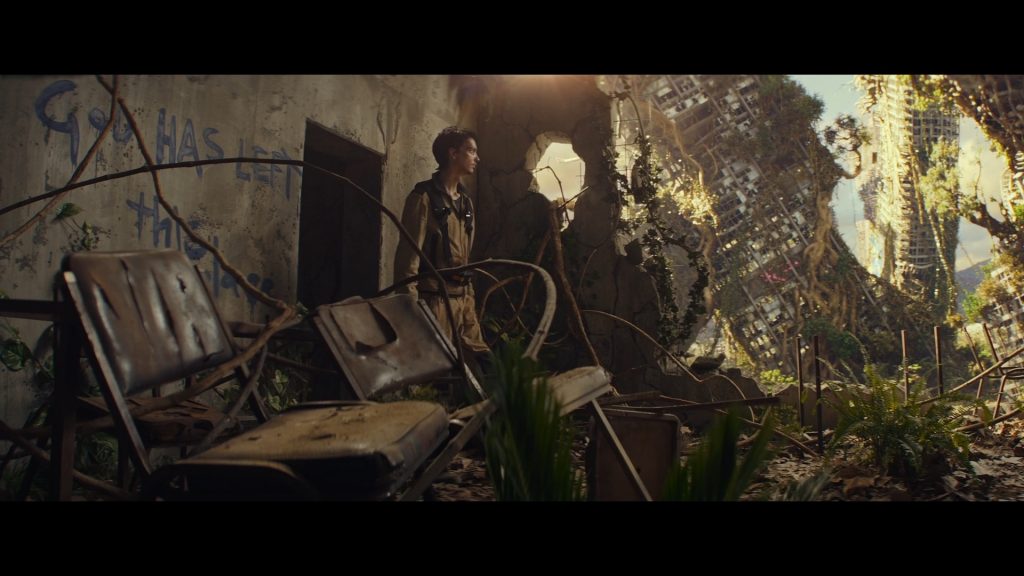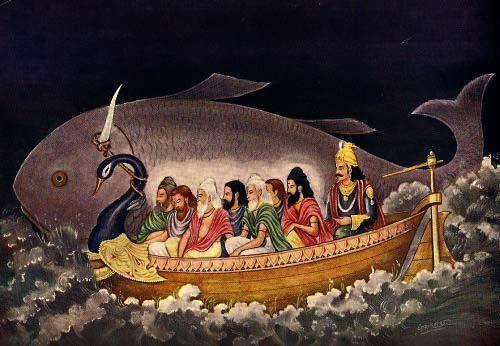A. C. 1300 am Tage Marcelli Pontificis (ist der 16. Jan.) hat sich die Westsee durch Sturmwinde erhoben, und das Wasser vier Ellen über die höchsten Deiche geführet, Städte und Dörfer umgekehret, und den Flecken Rungholt neben sieben Kirchspielkirchen in Edomsharde verwüstet, andere mehr anjetzo zu geschweigen, und seyn dazumal 7600 Menschen ertrunken, und 21 Wehlen im Nordstrande eingerissen. […]
Unter allen diesen ertrunkenen Oertern ist insonderheit benamet der Flecken Rungholt, von dessen Verwüstung und Untergang, wie auch künftigen Wohlstande der gemeine Mann beides in vorigen und auch noch in jetzigen Zeiten viel Wunderdinges erzählet. Inmaßen man berichtet, daß auf eine Zeit etliche muthwillige Gäste eine Sau, mit Urlaub, sollen trunken gemachet und zu Bette geleget haben, und darauf den Prediger lassen ersuchen, er möchte ihrem Kranken das Abendmahl reichen, und sich dabey verschworen, daß, wenn er bey seiner Ankunft ihren Willen nicht würde erfüllen, sie ihn in den Graben stoßen wollten. Wie aber der Prediger das H. Sacrament nicht so gräulich wollen mißbrauchen, und sie sich unter einander besprochen: ob man nicht sollte halten, was man geschworen? Und der Prediger daraus leichtlich gemerket, daß sie nichts Gutes mit ihm im Sinne hätten, hat er sich stillschweigens davon gemacht. Indem er aber wieder heim gehen wollen, und ihn zwo gottlose Buben, so im Kruge gesessen, gesehen, haben sie sich beredet, daß so er nicht zu ihnen herein gehen würde, sie ihm die Haut wollten voll schlagen. Seyn darauf zu ihm hinaus gegangen, haben ihn mit Gewalt ins Haus gezogen, und gefraget wo er gewesen? Und wie ers ihnen geklaget, wie man mit Gott und ihm habe geschimpfet, haben sie ihn gefraget, ob er das H. Sacrament bey sich hätte? und ihn gebeten, daß er ihnen dasselbe möchte zeigen. Darauf er ihnen die Büchse gegeben, darin das Sacrament gewesen, welche sie voll Biers gegossen, und gotteslästerlich gesprochen, daß so Gott darinnen sey, so müsse er auch mit ihnen saufen, und wie der Prediger auf sein freundliches Anhalten die Büchse wieder bekommen, sey er damit zur Kirche gegangen, und habe Gott angerufen, daß er diese gottlosen Leute wolle strafen. Darauf er in der folgenden Nacht sey gewarnet worden, daß er aus dem Lande, so Gott verderben wollte, sollte gehen, sey auch aufgestanden und davongegangen, und habe sich also bald ein ungestümer Wind und hohes Wasser erhoben, dadurch das ganze Land Rungholt (oder wie andere melden, ganze sieben Kirchspiele, worunter Rungholt das vornehmste gewesen) sey untergegangen, und niemand davon gekommen, als gemeldeter Prediger und zwo (oder, wie andere setzen, seine Magd und drei) Jungfrauen, so den Abend zuvor von Rungholt aus auf Bopschlut zur Kirchmeß seyn gegangen, von welchen Backe Boisens Geschlecht zu Bopschlut soll entsprossen seyn, dessen Nachkommen theils noch jetziger Zeit in diesem Lande seyn vorhanden und verhält sich ihre Genealogie folgendernmaßen: […].
Sonsten stehen die alten abergläubischen Leute im Wahn, daß dieses Rungholt noch einmal wieder werde aufstehen, und vor dem jüngsten Tage zu vorigem Stande kommen, melden auch, daß diese Stadt mit allen Häusern ganz in der Erde stehe, und dessen Thurm und Mühlen (desgleichen man auch von Kirchspiel Alver oder Kalfer an der Süderog und andern untergesunkenen Oertern und Städten berichtet) sich öftermals bey hellem Wetter hervor thue, und klar sehen lasse, und daß auch von den vorüberfahrenden der Glockenklang und dergleichen noch jetzunder gehöret werde, doch wird dieses von andern entweder für einen alten Weibertraum oder auch für eine zur Bestätigung des Aberglaubens erdichtete Fabel gehalten. Und ist derselben Meinung der Wahrheit ähnlicher, welche erachten, daß dieser Flecken neben den umliegenden Kirchspielen durch eine hohe Fluth, nach Art dieser niedrigen Länder, sey überschwemmet, habe äußerste Noth gelitten, sey aus dem Deichbande geworfen, und also endlich zu salzen See geworden.
Und erachte ich, daß dieselbe Kirche bey der Süderog am Hamburger Sande wird gelegen haben, maaßen man daselbst noch einen Ort zeiget, welcher Süntkalff wird geheißen, und von welchem ein Sprichwort ist: Wenn upstahn wert Suntkalff, so wert Strand sinken halff! wiewol dieses, leider! erfolget, und jenes hinterblieben.
[…] wie der Deichgraf in Risummohr nach verfertigtem Deiche den Spaten auf den Deich gesetzet, und vermessentlich gesaget: Trotz nun blanke Hans! [27]
This is one of the earliest published versions of the story of the sunken city Rungholt in Northern Germany. Published in 1668 in a Chronicle of North Friesland.
Extensive info (german): http://www.g.eversberg.eu/MWStormWiss/Seite17.htm#_edn26
Germany; 17. Century; Christian; Chronicle; City: Rungholt



